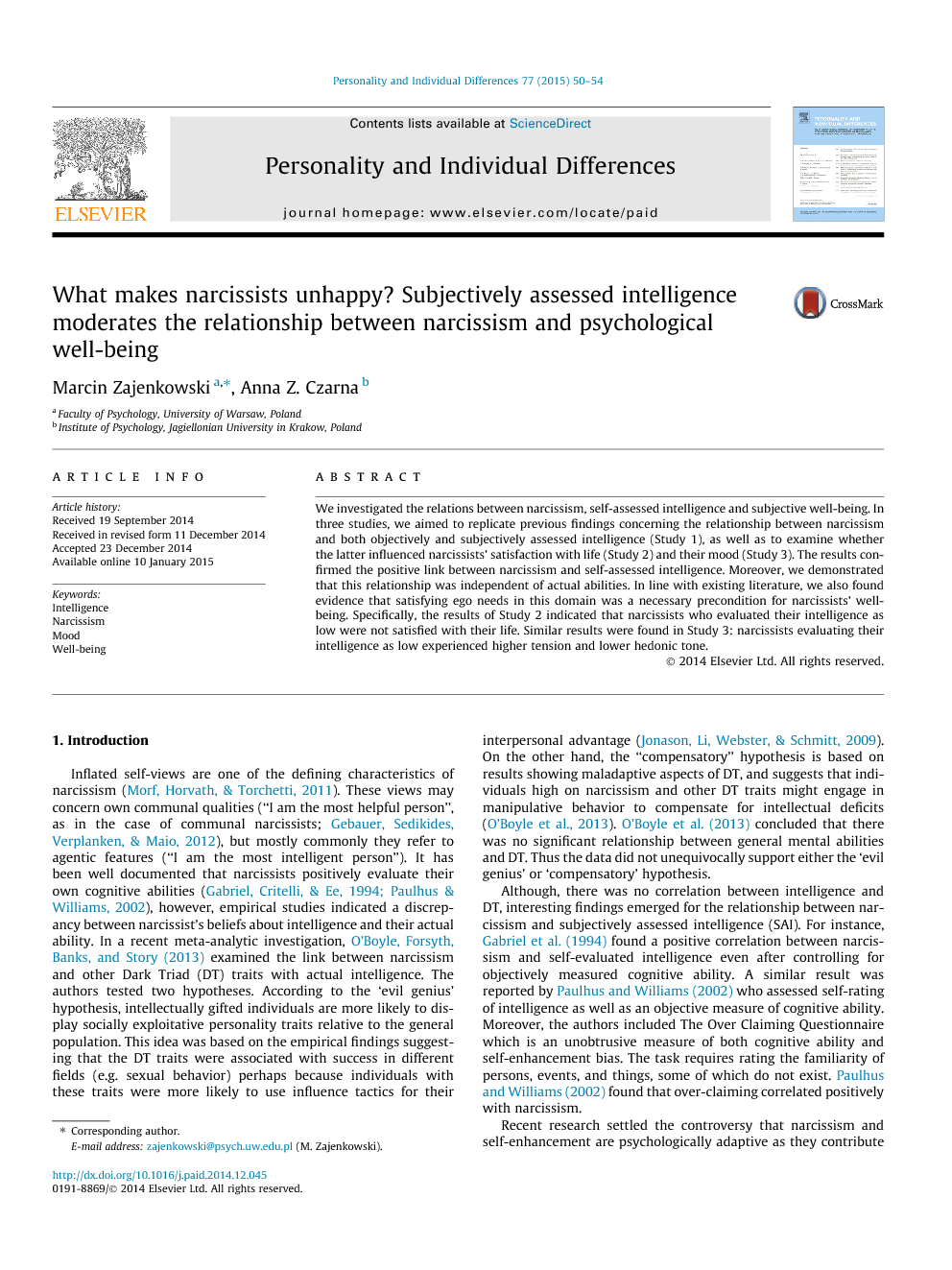We investigated the relations between narcissism, self-assessed intelligence and subjective well-being. In three studies, we aimed to replicate previous findings concerning the relationship between narcissism and both objectively and subjectively assessed intelligence (Study 1), as well as to examine whether the latter influenced narcissists’ satisfaction with life (Study 2) and their mood (Study 3). The results confirmed the positive link between narcissism and self-assessed intelligence. Moreover, we demonstrated that this relationship was independent of actual abilities. In line with existing literature, we also found evidence that satisfying ego needs in this domain was a necessary precondition for narcissists’ well-being. Specifically, the results of Study 2 indicated that narcissists who evaluated their intelligence as low were not satisfied with their life. Similar results were found in Study 3: narcissists evaluating their intelligence as low experienced higher tension and lower hedonic tone.
Inflated self-views are one of the defining characteristics of narcissism (Morf, Horvath, & Torchetti, 2011). These views may concern own communal qualities (“I am the most helpful person”, as in the case of communal narcissists; Gebauer, Sedikides, Verplanken, & Maio, 2012), but mostly commonly they refer to agentic features (“I am the most intelligent person”). It has been well documented that narcissists positively evaluate their own cognitive abilities (Gabriel et al., 1994 and Paulhus and Williams, 2002), however, empirical studies indicated a discrepancy between narcissist’s beliefs about intelligence and their actual ability. In a recent meta-analytic investigation, O’Boyle, Forsyth, Banks, and Story (2013) examined the link between narcissism and other Dark Triad (DT) traits with actual intelligence. The authors tested two hypotheses. According to the ‘evil genius’ hypothesis, intellectually gifted individuals are more likely to display socially exploitative personality traits relative to the general population. This idea was based on the empirical findings suggesting that the DT traits were associated with success in different fields (e.g. sexual behavior) perhaps because individuals with these traits were more likely to use influence tactics for their interpersonal advantage (Jonason, Li, Webster, & Schmitt, 2009). On the other hand, the “compensatory” hypothesis is based on results showing maladaptive aspects of DT, and suggests that individuals high on narcissism and other DT traits might engage in manipulative behavior to compensate for intellectual deficits (O’Boyle et al., 2013). O’Boyle et al. (2013) concluded that there was no significant relationship between general mental abilities and DT. Thus the data did not unequivocally support either the ‘evil genius’ or ‘compensatory’ hypothesis.
Although, there was no correlation between intelligence and DT, interesting findings emerged for the relationship between narcissism and subjectively assessed intelligence (SAI). For instance, Gabriel et al. (1994) found a positive correlation between narcissism and self-evaluated intelligence even after controlling for objectively measured cognitive ability. A similar result was reported by Paulhus and Williams (2002) who assessed self-rating of intelligence as well as an objective measure of cognitive ability. Moreover, the authors included The Over Claiming Questionnaire which is an unobtrusive measure of both cognitive ability and self-enhancement bias. The task requires rating the familiarity of persons, events, and things, some of which do not exist. Paulhus and Williams (2002) found that over-claiming correlated positively with narcissism.
Recent research settled the controversy that narcissism and self-enhancement are psychologically adaptive as they contribute to intra- and inter-personal adjustment (Dufner et al., 2012). Moreover, the link between both variables and intrapersonal adjustment has been shown to be mediated by self-esteem (Dufner et al., 2012 and Sedikides et al., 2004). However, there were no studies explicitly examining the role of cognitive self-enhancement for narcissist’s life. Thus, it would be interesting to see to what extent narcissists’ positive illusions about intellectual abilities influence their subjective well-being, one of the most important psychological constructs determining the quality of life as well as many real life outcomes, including health and longevity (Diener & Chan, 2011).
In the current research, we investigated the relationships between narcissism, SAI and subjective well-being. Is high regard of one’s own cognitive abilities not only a distinctive feature of narcissists but also a crucial and necessary condition for their well-being? We hypothesize that a narcissist frustrated in their egotistic needs concerning their own cognitive abilities is an unhappy narcissist. In three studies, we aimed to replicate the previous findings concerning the relationship between narcissism and both objectively and subjectively assessed intelligence (Study 1), as well as to examine whether the latter influences narcissists’ satisfaction with life (Study 2) and their mood (Study 3) – the two components of subjective well-being (Diener, Suh, Lucas, & Smith, 1999).


